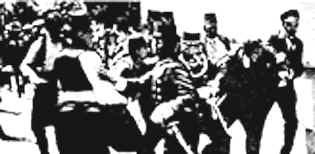The murder of Franz Ferdinand in Sarajevo is accepted by historians as the immediate cause of World War One though serious trouble – long term causes – had been brewing for sometime.
On June 28th 1914, the heir to the Austrian Empire, Franz Ferdinand, was visiting Sarajevo, the capital of Bosnia.
Bosnia was in the very south-east corner of the Austrian empire and some people there wanted to be independent from Austria and set up their own state which could run itself.
Franz Ferdinand had been warned that his visit could provoke trouble but he ignored this advice and visited Sarajevo regardless. As was common at the time, he travelled in an open topped car.
|
Franz Joseph and his wife |
There had been trouble at the start of his royal tour of Sarajevo when another car in his entourage was hit by a grenade and an Austrian officer had been injured. Clearly, Sarajevo was a dangerous place to be.
However, Franz Ferdinand wanted to demonstrate that his family was in control of Sarajevo and to have stopped the tour would have been seen as a sign of weakness by those who did not want Bosnia and Sarajevo ruled by the Austrians.
Franz ordered that his route through Sarajevo be changed at the last minute as he wanted to see the injured officer in hospital. Unfortunately, his driver did not fully understand his instructions and got lost.
Stopping to check where he was, the driver attempted to reverse out on to the main street. By bad luck, he stopped right by a man called Gavrilo Princip. He was a member of the Black Hand Gang which wanted to rid Bosnia of Austrian rule. He had also been behind the grenade throwing and was now trying to disguise himself among the many people who lined the streets fearing the police might arrest him. Not believing his luck, Princip pulled out the revolver he had on him and shot Franz and his wife. Both died as a result.
There was also a photographer at the scene and he captured scenes that were printed throughout the world.
|
Princip, second on the right, under arrest |
But how did this murder of an unpopular man lead to war?
A country called Serbia was blamed by Austria for this murder. Serbia was near to Bosnia and it had encouraged the Black Hand Gang and given the gang weapons. What did Serbia want out of this? She hoped that both herself and Bosnia would unite to form a new Balkan state.
Austria decided that Serbia must be punished and planned to invade her. Serbia called on her old friend Russia to help her. Now the alliance/entente came in to play. One country from each was involved on opposite sides. The situation could only get worse.
Serbia would have been easy for Austria to crush. Russia was a different issue. She had a huge army and Austria would not have coped with a Austro-Russian war. Austria called on Germany for help. The German government agreed to this and their response provoked the French government.
However, unknown to anybody other than the German government, the German army had created a plan called the Schlieffen Plan. Schlieffen was a senior German army officer and he believed that the German army was superior to any army in Europe but that it could not fight a war on two fronts – France and Russia.
However, he calculated that the vast Russian army would take 6 weeks to get itself organised – called mobilisation – and that in that time, the Germans could attack the French, beat them and then send their army across Europe to fight the Russians. The German High Command accepted this plan. But it had one problem. It relied on what the French or Russians did and the actions of one would provoke a German response and not the other way round. In other words, the Germans had to react to a situation as opposed to controlling it.
When France called up her army, Germany had no choice but to carry out the Schlieffen Plan. This plan involved an attack on France via Belgium.
Britain had given Belgium a guarantee in 1839 that if anybody attacked her, Britain would attack the attacker.
Therefore, within weeks of the murder at Sarajevo, five out of the six countries that had signed the two treaties were on the verge of war.
On August 4th, 1914, Germany invaded Belgium. Britain declared war on Germany. France and Russia supported Britain. Austria supported Germany. Only Italy did not get involved – yet.
Every country concerned was convinced that the war would last only from August to Christmas 1914. No-one envisaged the horrors of trench warfare.

